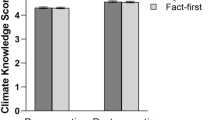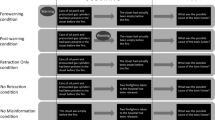Abstract
Studies show that misconceptions about psychology are pervasive. This study examined how the strength of prior beliefs and the sources of misinformation relate to conceptual change following an introductory psychology course. Ninety introductory psychology students completed a 36-item “Psychological Information” questionnaire. Testing during the 1st day of the semester showed 38.5% accuracy whereas testing during the last week showed 66.3% accuracy. These results suggest that misconceptions remain prevalent but can be reduced by taking an introductory psychology course. Our data also indicate that strength of belief is an important transitional variable that may reflect the process of change. Finally, although personal experience and media are important sources of misinformation, we found that they do not promote strongly held beliefs.
Similar content being viewed by others
References
BARNETT, M. A. (1986). Commonsense and research findings in personality. Teaching of Psychology, 13, 62–64.
BRANSFORD, J. D., BROWN, A. L., & COCKING, R. R. (2000). How people learn: Brain, mind, experience and school. Washington, Dc: National Academy Press.
BROWN, L. T. (1983). Some more misconceptions about psychology among introductory psychology students. Teaching of Psychology, 10, 207–210.
BROWN, L. T. (1984). Misconceptions about psychology arent always what they seem’. Teaching of Psychology, 11, 75–78.
COMMITTEE ON UNDERGRADUATE SCIENCE EDUCATION (1997). Misconceptions as barriers to understanding science. In Science teaching reconsidered: A handbook (chapter 4). [Electronic version], Washington, DC: National Academy of Sciences.
DELLA SALLA, S. (1999). Mind myths. New York: Wiley.
DOLE, J. A. (2000). Readers, texts and conceptual change learning. Reading & Writing Quarterly, 16, 99–118.
DOLE, J. A., & SINATRA, G. M. (1998). Reconceptualizing change in the cognitive construction of knowledge. Educational Psychologist, 33,109–128.
ELKIND, D. (1987, May). The child yesterday, today and tomorrow. Young Children, 6–11.
GARDNER, R. M., & DALSING, A. (1986). Misconceptions about psychology among college students. Teaching of Psychology, 13, 32–34.
GARDNER, R. M., & HUND, R. M. (1983). Misconceptions of psychology among academicians. Teaching of Psychology, 10, 20–22.
GARRETT, H. E., & FISHER, T. R. (1926). The prevalence of certain popular misconceptions. Journal of Applied Psychology, 10, 411–420.
GRIGGS, R. A., & RANSDELL, S. E. (1987). Misconception tests or misconceived tests? Teaching of Psychology, 14, 210–214.
GUTMAN, A. (1979). Misconceptions of psychology and performance in the introductory course. Teaching of Psychology, 6, 159–161.
HIGBEE, K. L., & CLAY, S. L. (1998). College students beliefs in the ten-percent myth’. The Journal of Psychology, 132, 469–476.
HYND, C. R., & GUZZETTI, B. J. (1993). Exploring issues in conceptual change. In D. J. Leu & C. K. Kinzer (Eds.), Examining central issues in literacy research, theory and practice (pp. 374–381). The National Reading Conference.
KOWALSKI, P., & TAYLOR, A. (April 2001). An exploratory study of developmental misconceptions. Paper presented at the American Educational Research Association Conference, Seattle, Wa.
KOWALSKI, P., TAYLOR, A., FREUND, L, & HOULDSWORTH, B. (2002, April). Assessing validity of measures of college student’s motivation to learn. Poster presented at the 82nd Annual Convention of the Western Psychological Association, Irvine, CA.
KRUGER, J., & DUNNING, D. (1999). Unskilled and unaware of it: How difficulties in recognizing one’s own incompentence lead to inflated self-assessments. Journal of Social and Personality, 77(6), 1121–1134.
LAMAL, P. A. (1979). College students common beliefs about psychology’. Teaching of Psychology, 6, 155–158.
LAMAL, P. A. (1995). College students misconceptions about behavior analysis’. Teaching of Psychology, 22, 177–180.
LIMON, M. (2001). On the cognitive conflict as an instructional strategy for conceptual change: A critical appraisal. Learning and Instruction, 11, 357–380.
MAKI, R. H. (1998). Test predictions over text materials. In D. J. Hacker, J. Dunlosky, & A. C. Graesser (Eds.), Metacognition in educational theory and practice. Mahwah, NJ: Lawrence Erlbaum Associates, Inc.
MCCUTCHEON, L. E. (1991). A new test of misconceptions about psychology. Psychological Reports, 68, 647–653.
MCCUTCHEON, L. E., FURNHAM, A., & DAVIS, G. (1993). A crossnational comparison of students misconceptions about psychology’. Psycholoqical Reports, 72, 243–247.
MCKEACHIE, W. J. (1960). Changes in scores on the Northwestern Misconceptions Test in six elementary psychology courses. Journal of Educational Psychology, 51, 240–244.
MESSER, W. S., & GRIGGS, R. A. (1989). Student belief and involvement in the paranormal and performance in introductory psychology. Teaching of Psychology, 16, 187–191.
MILLER, R. L., WOZNIAK, W. J., RUST, M. R., MILLER, B. R., & SLEZAK, J. (1996). Counterattitudinal advocacy as a means of enhancing instructional effectiveness: How to teach students what they do not want to know. Teaching of Psychology, 23, 215–219.
OTERO, J. (1998). Influence of knowledge activation and context on comprehension monitoring of science texts. In D. J. Hacker, J. Dunlosky, & A. C. Graesser (Eds.), Metacognition in educational theory and practice (pp. 145–164). Mahwah, NJ: Erlbaum.
PANEK, P. E. (1982). Do beginning psychology of aging students believe 10 common myths of aging? Teaching of Psychology, 9, 104–105.
PINE, K., MESSER, D., & ST.JOHN, K. (2001). Children’s misconceptions in primary science: A survey of teachers’ views. Research in Science & Technological Education, 19, 79–96.
POSNER, G. J., STRIKE, K. A., HEWSON, P. W., & GERTZOG, W. A. (1982). Accommodation of a scientific conception. Toward a theory of conceptual change. Science Education, 66, 211–227.
QIAN, G., & GUZZETTI, B. (2000). Conceptual change learning: A multidimensional lens. Reading & Writing Quarterly, 16, 1–3.
RUBLE, R. (1986). Ambiguous psychological misconceptions. Teaching of Psychology, 13, 34–36.
Science and engineering indicators 2002. Chapter 7: Science and technology: Public attitudes and public understanding. Retrieved on 5-1-02 from http://www.nsf.gov/sbe/sre/seind02/start.htmT059
SEGAL, J. (1989, July). Ten myths about child development. Parents, 81–84.
SIMES, R. J. (1986). An improved Bonferroni procedure for multiple tests of significance. Biometrika, 73, 751–754.
STERNBERG, R. J., & GRIGORENKO, E. L. (1999). Myths in psychology and education regarding the gene-environment debate. Teachers College Record, 100, 536–553.
TAYLOR, A., & KOWALSKI, P. (June, 2002). Variables affecting reducing misconceptions in psychology. Poster presented at the Ninth Annual Aps/Stp Teaching Institute, at the 14th American Psychological Society Annual Convention, New Orleans, LA.
TAYLOR, A., KOWALSKI, P., & LAGGREN, L. (April, 2000) Myths & misconceptions about psychology: Strength of belief is not related to accuracy. Poster presented at the 80th Annual Convention of the Western Psychological Association, Portland, OR.
TAYLOR, A., KOWALSKI, P., NEGIN, L., & HEISE, R. (May, 2001). Sources of misinformation in psychology: Media, personal experience, and the classroom. Poster presented at the 81st Annual Convention of the Western Psychological Association, Maui, HI.
VALENTINE, W. L. (1936). Common misconceptions of college students. Journal of Applied Psychology, 20, 633–658.
VAUGHN, E. D. (1977). Misconceptions about psychology among introductory college students. Teaching of Psychology, 4, 38–41.
VOSNIADOU, S. (2001). What can persuasion research tell us about conceptual change that we did not already know? International Journal of Educational Research, 35, 731–737.
WRIGHT, D. B., GASKELL, G. D., & O’MUIRCHEARTAIGH, C. A. (1997). The reliability of subjective reports of memories. European Journal of Cognitive Psychology, 9, 313–323.
Author information
Authors and Affiliations
Corresponding author
Additional information
This work was supported, in part, by the University of San Diego through Faculty Research Grants to both authors.
Rights and permissions
About this article
Cite this article
Taylor, A.K., Kowalski, P. Naïve Psychological Science: The Prevalence, Strength, and Sources of Misconceptions. Psychol Rec 54, 15–25 (2004). https://doi.org/10.1007/BF03395459
Published:
Issue Date:
DOI: https://doi.org/10.1007/BF03395459




